74 AD - Masada Falls
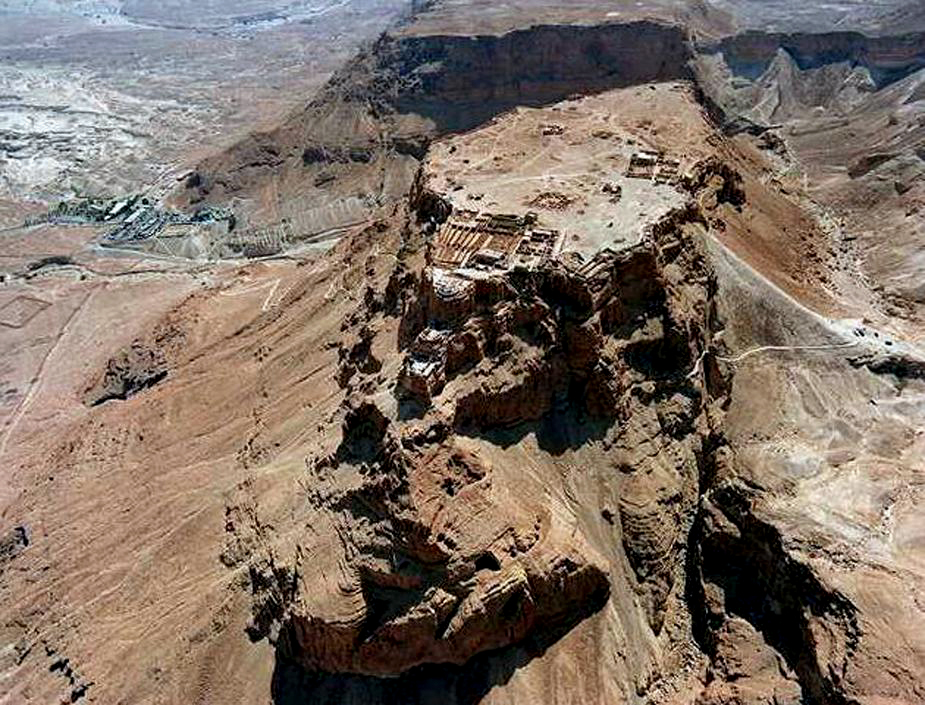
Aerial view of Masada, looking south.
With the fall of Jerusalem and the destruction of the Temple, the Roman army was now left only to mop up the rest of the rebellion. First, the rebels who had occupied Herodion was put down by the Roman legate Lucilius Bassus. Next, he turned his attention to Macherus. Finally, the end came with the fall of Masada.
Masada had been controlled by the Romans since the deposition and exile of Archelaus in 6 AD. The fortress, however, was captured by the rebels early in the summer of 66, in the early stages of the Jewish revolt. With the murder of its brutal leader, Menachem, the site fell to a band of Sicarii under the leadership of Eliezer Ya'ir. From then on the rebels at the fortress took no active part in the revolt. Masada, therefore, had no miliatary value to the Romans; its capture, however, would send a powerful message about what Rome would do to those who opposed her. Hence, the lack of urgency about its capture.
The task of taking Masada fell to Lucilius Bassus' successor, Flavius Silva. Upon arriving at Masada in the winter of 73, he set up a ring of eight fortified camps around the site. The fortress, however, could only be reached by a steep, narrow, snaking path from the east; any soldier attempting to take the fortress from this route would face certain death from the missiles that could be brought down on them from the top. The rest of the fortress is sheer vertical rock faces several hundred meters high. The shortest of these vertical cliff-faces is 150 meters, on the western side of the rock massive. Here Sliva had his command camp and here he concentrated his effort (right in the photo above, and photo below).
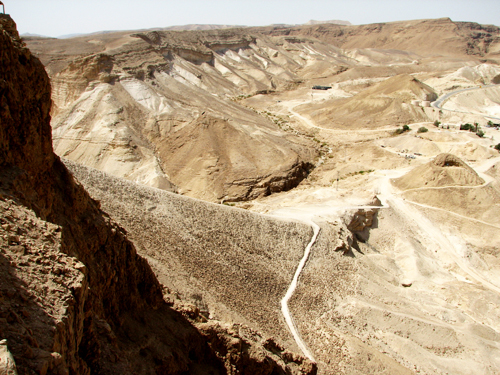
The ramp ordered built by Flavius Silva to access the fortress above.
Using slave labour, he had a ramp built across the wadi towards the top of the massif from which he could then build a 25 m high rock platform directly beneath the wall of the fortress. On this he would built an iron-sheathed wooden tower equipped with ballistae (sling shots) from which missiles may be shot at the defenders within the fortress. From this platform also the Romans deployed their battering rams to wrack the wall. Yet when the wall was breached they found that the Jewish defenders had erected a wooden one behind it. This they now set on fire. At first a north wind threatened to spread the fire back against the Roman war machines but soon the wind changed direction, "as if it were done by Divine Providence," says Josephus, and the wooden wall began to burn. Confident that the next day would be the end of the affair, they withdrew for the night, with guards set to make sure no one tried to escape through the developing gap during the night.
The next morning the Roman soldiers, suitably armoured for battle, entered the breach into the fortress expecting to be met with a rush of enemies. Instead they were met with an eerie silence everywhere. At lenght someone made a shout. A short while after this two women emerged from hiding and told them what had happened.
Seeing that the end was inevitable, Eliezer had gathered his people together and then addressed them a soul-stirring speech.
Since we, long ago, resolved never to be slaves to the Romans, or to any other than to God himself . . . the time has now come that obliges us to make good that resolution . . . we were the first to fight against them and we are now the last. I cannot but count it as a favour that God has granted us that it is still in our power to die bravely and in freedom, a favour that had not been granted to others who had been defeated. It is now obvious that we have no more than a day's time in our hands. But it is still possible for us to die gloriously, together with our dear ones. This is something that our enemies cannot deny us . . . We can no longer fight them and win . . . though we live in this fortress which is so well provisioned with a great abundance of food and arms and other necessities more than we want, we are openly deprived by God himself of all hope of deliverance, for that fire which was driven upon our enemies did not of its own accord turn back upon the wall that we had built. This is the effect of God's anger with us for our many sins . . . Let us not receive our punishment from the Romans but from God himself, as executed by our own hands . . . Let our wives die before they are abused, and our children before they have tasted slavery, and after we have slain them, let us bestow that glorious benefit upon one another mutually, and so preserve ourselves in freedom, as an excellent funeral monument for us . . . let us spare nothing but our provisions so that they well be a testimony when we are dead that we were not subdued for want of necessities, but that we have preferred death to slavery."1
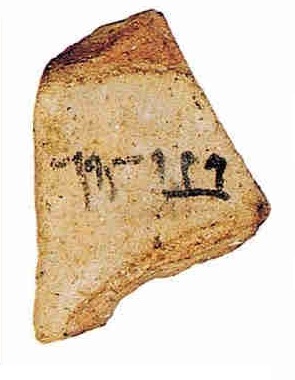
One of the chips, with the person's name, by which the lot was decided.
So they killed their family members, and then cast lots to decide who should be the last man left who would kill his remaining companion and then himself. In all 960 men, women, and children died, on the night of 15 Nisan - the Passover. Only the two women who chose to hide, and five children, survived the ordeal.
This poignant account, so traditionally embraced2, however, is now open to questions. Though Masada is mentioned in passing in the accounts of Pliny the Elder on Masada, Josephus's account in The Jewish War is our only source of details about the fall of Masada. But Josephus was not an eye-witness; by the time of the Masada's siege he was already comfortably sequested in Rome. His account, e.g., of Eliezer's speech may be soul-stirring but we have no way of knowing to what extent it reflected actual events. Though it is possible that he may have consulted Flavius Silva when the latter had returned to Rome, is it really possible for Josephus to reconstruct accurately Eliezer's speech? Some scholars also question the military integrity of Josephus' account. Jerome Murphy-O'Connor, e.g., says, "Josephus's account becomes utterly incredible from the moment he has the Romans retire once they have breached the wall. Even though night had fallen, it was Passover and there was a full moon. In any case they would have driven home the attack, as Vespasian did at Jotapata (War, 3:235, 323). This means that there was no time for Josephus's scenario of heroic suicide."3 That may be so, but Josephus's accounts is, in the end, all that we have that archaeological findings do not, and cannot, provide.
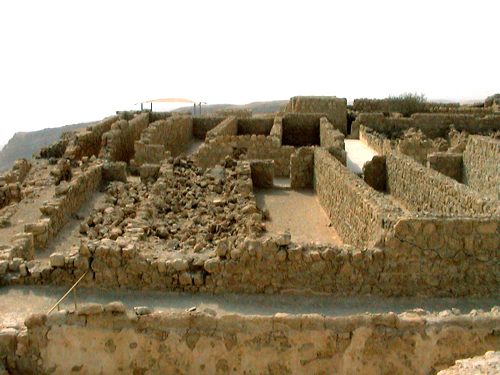
Some of the store-rooms which were filled with provisions at the time of the fall."
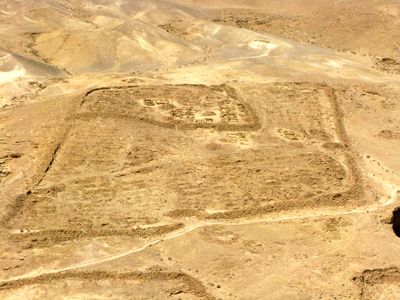
Remains of one of the Roman camps at the base of the fortress.

Footnotes:
1. Josephus, Jewish War, 7.8.6.
2. The heroism of the suicide pact so fired up readers it became the foundation myth of Zionism. In the earlier days of modern Israel, fresh recruits into the IDF were routinely taken to Masada where they were initiated into the spirit of the myth.
3. Jerome Murphy-O'Connor, The Holy Land (Oxford Archaeological Guides; Oxford: Oxford University Press, 1998),337.

Low Chai Hok
©Alberith, 2015